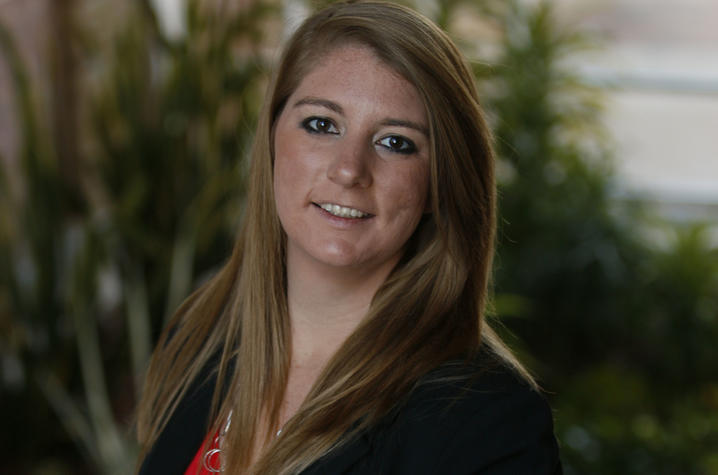Fischer Earns ACE 2018 Outstanding Dissertation Award

LEXINGTON, Ky. (July 18, 2018) — The Association for Communication Excellence (ACE) in Agriculture, Natural Resources, and Life and Human Sciences has selected Laura Fischer, assistant professor for the Department of Integrated Strategic Communication (ISC), in the College of Communication and Information at the University of Kentucky, as the recipient of the 2018 ACE Outstanding Dissertation Award. ACE, established in 1913, is an international association of communicators, educators and information technologists that offers professional development and networking opportunities to its members.
Fischer won the prestigious award for her dissertation titled "Examining the Role of Motivational Salience, Issue Involvement, and Pre-existing Attitudes on Selective Attention and Attitude Strength to Advertisements." Fischer, whose background is in agricultural production, aimed to research how strategic communication can be used to influence positive perceptions of the agricultural industry.
“A lot of people are showing a major decrease in trust toward the sciences and especially how food is produced,” Fischer said. “My research looks at how we can make information more salient and for people to attend to information for longer, as well as process the information more critically.”
In her study, Fischer utilized two different message strategies: one meant to appeal to values held by the audience, the other based on scientific reasoning. From these two strategies, she developed eight advertorials tackling two scientific issues in agriculture today: genetic modification and antibiotic use in livestock. The advertorials were designed to promote trust in the food safety techniques used by the agricultural industry.
To measure the success of her message strategies, Fischer used eye tracking technology to quantify visual attention allocation, which is the amount of time her subjects spent looking at different parts of the advertorials. Her results found that value-oriented messages had higher levels of visual attention allocation, even for people with low involvement to the agricultural industry. Value-oriented messages resulted in more positive attitudes and greater trust than the messages based on scientific reasoning.
Fischer’s research was built from work she contributed to a $150,000 Capacity Building Grants for Non-Land Grant Colleges of Agriculture (NLGCA) Program while pursuing her doctoral degree at Texas Tech University. The research project, titled "The Consumer Experience: Using Innovative Research Tools to Develop and Test Messages about Food and Agricultural Science," utilized a methodology heavily crafted by her.
“Eye tracking, dial testing and psychophysiology, while not new, have been limitedly used by communication and social scholars,” Fischer said. “These tools allow us as researchers to uncover the dynamic nature in which audiences respond to media and communications.”
Fischer’s interest in innovative methodologies has led to a collaboration with Associate Professor Jeannette Sutton in the Department of Communication. Both are currently working on a college-level grant to research how visual attention allocation and prior experiences influence risk perceptions. Their findings will then be used to develop a preliminary theoretical model of visual risk information seeking and processing.
In August, Fischer will present a portion of her dissertation at the Association for Education in Journalism and Mass Communication (AEJMC) Conference in Washington, D.C., under the Communicating Science, Health and Environmental Research division. As described on their website, AEJMC’s mission is to advance education, foster scholarly research, cultivate better professional practice and promote the free flow of communication.
“I am very excited to present this research to a national audience at AEJMC,” Fischer said. “The national research agenda in science communication has a strong focus on how strategic communication can influence public opinion of the sciences. I hope this research helps us to further understand how we can improve understanding, and more positive perceptions, of how people process scientific information.”




